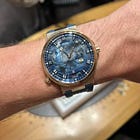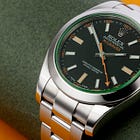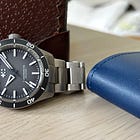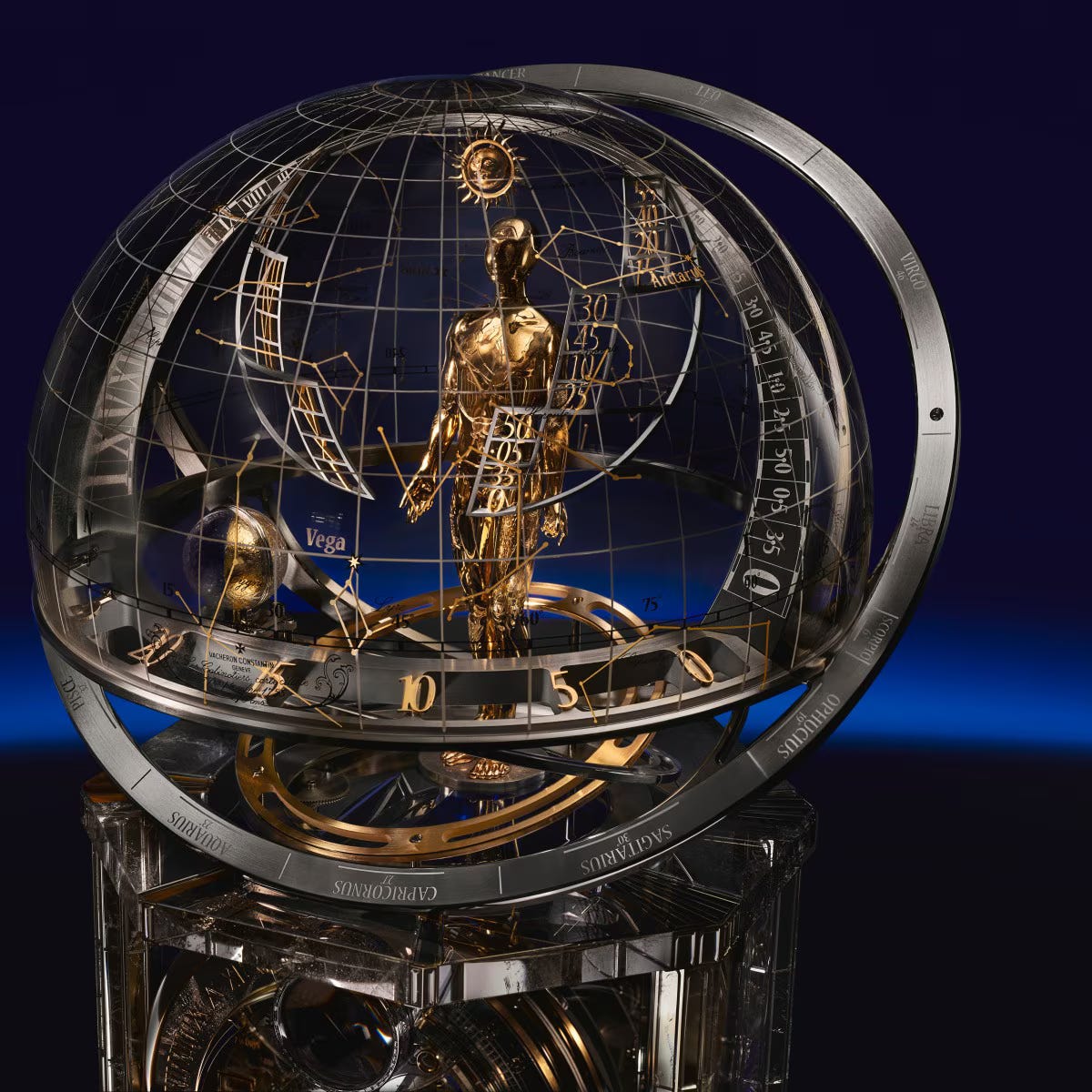Issue 172: Bennahmias Is Back And He's Buying Brands
The former Audemars Piguet CEO is building a new luxury group and shopping for watch companies. Also: are press trips a waste of time and money?
Hello and welcome back to The Fourth Wheel, the weekly watch newsletter that, yes, is going to bang on about filling in a survey for the third week in a row. No, I’m not sorry. It’s for your own good - well, that might be a stretch, but seriously, imagine subscribing to this newsletter, enjoying its take on the watch industry and then realising you have a chance to improve it. I’m asking as many of you as can spare the time - about ten, maybe 15 minutes - to tell me what you think of what I do so that I can try and do it better.
I’m giving away some watch brand merch to one randomly selected winner (full Ts&Cs in Issue 170) but we all know the real prize will be the warm feeling of satisfaction you get when you complete the survey. Or perhaps the relief that soon - maybe as soon as next week! - I’ll stop pestering you about it. Go on, you know you want to.
In this week’s newsletter:
A (partial) defence of lavish press trips
‘Doom & Gloom Corner’: Thoughts on GWD, rising prices and reduced hiring in Switzerland
Repairing the Breguet Marie Antoinette
And the main event: Francois-Henry Bennahmias’ return to the luxury arena. What’s he doing, who’s bankrolling it, and what will it mean for the watch world?
The Fourth Wheel is a reader-supported publication with no advertising, sponsorship or commercial partnerships to influence its content. It is made possible by the generous support of its readers: if you think watch journalism could do with a voice that exists outside of the usual media dynamic, please consider taking out a paid subscription. You can start with a free trial!
Here’s a little taste of what you might have missed recently:
Time to derail the gravy train?
Some say watch brands should stop lavish trips for journalists and focus on customers
An opinion I’ve encountered quite a few times recently from customers of watch brands is that luxury watchmakers would be better off if they cut back on lavish press trips for journalists1. As a lot of people apparently see it, wining and dining the press is distracting brands from focussing on what matters - making better watches - and moreover, it seems to send the message to brands’ customers, the people who actually spend thousands on their products, that they aren’t as highly valued as someone who can get thousands of likes on Instagram.
At the same time, a fondness for free booze and travel is habitually named as one of the worst sins of the esteemed members of the horological press corps (such as myself), and cited as evidence of our total corruption.
As I write this, a substantial number of my journalistic friends and colleagues are on a press trip hosted by Vacheron Constantin that seems closer and closer to a hostage situation with every passing day. It’s a four-day trip to both Paris and Geneva, centred around the unveiling of a remarkable clock. Many of you will have read coverage of said clock, the accompanying watch and their installation in the Louvre this week from journalists who may or may not actually be on the trip, but I will argue that being there makes all the difference.
Watch journalism (which I have done enough to both criticise and defend; have a browse in the TFW archive) has been described pejoratively as ‘access journalism’; i.e. as a writer, your access to brands and key personnel is strictly controlled, and all other things being equal (which they certainly aren’t, but go with me for a bit), your success as a publication has historically largely depended on how good your access is, which in turn has usually (but it must be said not always) gone hand-in-hand with positive coverage.
It is certainly true that your invites to such things can get lost in the post if you’re not sufficiently ‘supportive’ of the brand in question, but this isn’t sour grapes on my part. I’ve been on plenty of trips (more on that in a moment) and turn down more than I accept - mostly due to family commitments.
I’d like to frame ‘access journalism’ differently, however. I am frequently asked about the rise of AI and its potential to disrupt my livelihood; press trips are an interesting example. I have in my inbox the press release for Vacheron Constantin’s clock, and I could have devoted this email to re-working the key details, itemising its functions and drowning you in details of its decoration. I don’t, because from my desk in south London there is nothing I can add. AI can take a press release and turn it into an informative article. Right now, there are tell-tale stylistic quirks that many find off-putting, but that won’t last forever. A large language model won’t run up a bar tab, fly business class or stay in a CHF 500 a night hotel room either - so it’s a win for the marketing budget and the environment, if not the hospitality industry.
But the AI can’t tell you anything about how the clock makes them feel, what it’s like to behold in person, and nor can it glean additional information from its creators. It can’t pick up gossip in the bar or on the plane, and it can’t put questions to the CEO and other senior staff. To state the bleeding obvious, it also can’t actually understand how the damn thing works, but then again, I suspect not every journalist on the trip can either.
You get my point. Journalism in the age of AI is going to become entirely about credible human experiences, and done properly that’s what the press trip should provide.
I am writing from the assumption that press trips are useful because what results from them - articles, videos, podcasts or photography - is useful. That’s a premise with which not everyone will agree; but hopefully we can agree that although some content is sub-standard, that is not reason enough to abandon press trips altogether. I believe that watchmaking - like most things, really - is better understood when you’ve seen it up close, and there are firm limits on what you can write at a distance, even though technology has made it easier than ever to conduct interviews.
The counterargument, easily made, is that too many press trips are excessively lavish. A couple of years ago I coined the ‘Mykonos Index’, a tongue-in-cheek reference to the litany of Mediterranean launches where the glamour and beauty of the location seemed sometimes to be inversely correlated with the significance and substance of the product being launched. Put simply, aren’t brands just buying coverage of boring watches with a free mini-break? Yes, sometimes they are. But to what extent that really works is debatable. The advertising is a lot more powerful! As someone who has worked as both a commissioning editor and a freelance writer, you know when someone is trying to pitch you a story just because they’ve had a nice trip and need to justify it somehow.
Even if you aren’t on an island somewhere, is it necessary to stay in nice hotels, and eat at nice restaurants? Of course not. But luxury brands are luxurious in everything they do; they have an image to maintain. Sometimes it’s great; other times you genuinely wish you could conclude the work elements of the trip and get back to your real life - and yes, my goodness, the tiny violins are out for the watch writers now. Please, not another chocolate fondant! But at the same time, some of my best experiences - and certainly some of the most professionally exciting - have been no-frills visits to indie brands, who may stump up for a BA flight to Geneva but aren’t going to book out a grand venue for 150 guests and lay on a three-course meal. Visiting an atelier in a small group or solo - that’s when you start to feel like you’re in touch with the real watch world.
In the spirit of total honesty, I’ve also been fortunate enough to have some great experiences on press trips that aren’t anything to do with the task at hand. Each of us adopts a different attitude to such things. Some journalists decline all trips out of principle. For me, that’s incompatible with my life as a writer outside of TFW. Some publications - US titles, mainly - still have the budgets to insist their writer pays their own way, but that hasn’t been my experience anywhere. I accept that from the outside looking in, it can seem wildly hedonistic, but I would say this: do you think I have gone easy on Bremont because they’ve invited me to various black tie events, and at one point let me drive some classic Jaguars around a track for a bit? I’d say not. I have reserved my right to be critical about Hublot, Omega, Richard Mille, AP and so many more, and all of them have at one point or another put me on a plane to Switzerland and shown me a nice time. It’s possible, to my mind, to separate the two. Equally, there are brands that have never taken me anywhere (Patek Philippe is one fairly notable example) and that doesn’t stop me covering what they do over and over again.
To return to the opening point, one aspect that amused me was that throughout my career, the press have always felt that top collectors and clients are treated better - and when I started coming into closer contact with collectors, I started hearing envy of journalists’ treatment. As a generalisation, I’d say that today more money is spent on customers than press by brands, and that’s probably how it should be. Maybe the dial is always greener2 on the other side. Cancel the press trip? By all means curb its worst excesses - but let’s not sever all contact in the name of parsimony.
In Brief
News snippets and assorted thoughts from the week gone by
As prices rise, my thoughts turn to retailers
You will most likely have seen the news that Patek Philippe raised prices in the USA by 15 per cent this week. Omega is said to have rolled out a similar increase, with Richemont about to follow suit, according to WatchPro. Others, mostly single-digit, are following. WatchPro also reports that retailers will be forced to accept slimmer margins, and I wonder how long we have before that idea starts to bleed into other markets? If the tariff remains in place, I give it a year. If watch brands realise they can trim margin in one of their biggest markets, I think they’ll start to force similar terms on retailers around the world. It doesn’t matter that the same tariffs don’t exist; if brands can normalise the US model, they will.
Is Geneva Watch Days a victim of its own success? (Bilan; in French and behind a paywall)
It’s not a coincidence that the same question that has been dogging Watches & Wonders is now rearing its head post-GWD. Geneva isn’t well equipped for large events, and the unavoidable truth is one I’ve touched on many times before: right now, we have more watch brands than the market can support. Reality just hasn’t caught up yet. Edouard Meylan is quoted in the above article saying that GWD is unsustainable in its current form. We’re seeing a ‘Watch Week’ pop up everywhere - Bangkok is next, apparently - and we’re closing in on ‘International Watch Day’ on the 10th of October (10/10, you see). It’s curmudgeonly I know but I can’t help thinking it’s all just too much watches.
Hiring is down by a third in French-speaking Switzerland (Blick.ch)
This data is across all sectors, but will absolutely apply to watch businesses. The gloomy economic indicators just keep coming…
Who will fix the Marie Antoinette?
When I spoke to Breguet CEO Gregory Kissling last week, he said that Breguet would be happy to take on the task of repairing the Model 160 pocket watch (which has not been fully functional since it was recovered in 2006 after being stolen in 1983). The brand has the expertise, he said, from having constructed the replica that was commissioned in the absence of the original.
Keep reading with a 7-day free trial
Subscribe to The Fourth Wheel to keep reading this post and get 7 days of free access to the full post archives.






